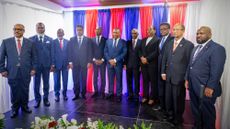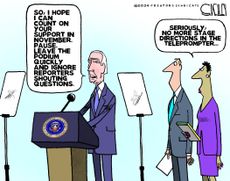Should the U.S. finance Egypt's new government?
Whether Obama pulls the plug on $1.5 billion in aid to Egypt depends largely on the meaning of the word "coup d'état"


On Wednesday, while Americans were preparing to celebrate our Independence Day, Egypt's military deposed democratically elected President Mohamed Morsi, detained him and a handful of other top leaders of the Muslim Brotherhood, and suspended the Constitution, swearing in Adly Mansour, the little-known chief justice of Egypt's supreme court, as interim president.
This puts the U.S. in a tough situation. "As one of the largest recipients of American aid," says Peter Baker in The New York Times, "Egypt has long depended on Washington's beneficence, and the Obama administration, like its predecessors, has been reluctant to shut off the spigot, to keep the country committed to its longstanding peace agreement with Israel." On the other hand, overthrowing Egypt's first popularly elected president is by definition anti-democratic, and runs pretty starkly against U.S. ideals.
The only real choice the Obama administration has, though, is in determining if this was a coup d'état. If it was, the Foreign Assistance Act mandates that the U.S. suspend Egypt's $1.3 million in annual military aid and $250 million in economic assistance. That determination normally falls to the State Department's legal adviser, a process that can take weeks or even months. With so much at stake, a war of semantics has broken out.
Subscribe to The Week
Escape your echo chamber. Get the facts behind the news, plus analysis from multiple perspectives.

Sign up for The Week's Free Newsletters
From our morning news briefing to a weekly Good News Newsletter, get the best of The Week delivered directly to your inbox.
From our morning news briefing to a weekly Good News Newsletter, get the best of The Week delivered directly to your inbox.
Morsi allies are calling it a full military coup. Relying on "verbal acrobatics" to argue otherwise is "some really Orwellian stuff," says senior Morsi adviser Wael Haddara. That hasn't deterred Egyptian officials and Morsi opponents, who argue that the overthrow was just fulfilling the will of the people, millions of whom gathered around the country demanding Morsi's ouster in the days beforehand.
"It's not a coup because the military did not take power," Mohamed Tawfik, Egypt's ambassador to Washington, tells Foreign Policy's Isaac Stone Fish. "The military did not initiate it. It was a popular uprising. The military stepped in in order to avoid violence."
For now, says The New York Times' Baker, Obama seems "content to let the debate play out in hopes of using the possibility of an aid cutoff to influence the situation without actually pulling the trigger yet."
That just isn't going to cut it, says The Washington Post in an editorial. "There is no ambiguity about what happened in Egypt on Wednesday: A military coup against a democratically elected government and the wrong response to the country's problems." Even if turning a blind eye would help "to ensure the lasting restoration of Egypt's democracy" — Obama's stated goal — by law the U.S. has to suspend the foreign aid. The only way to restore democracy, the Post says, is to hold Egypt's military accountable:
Sign up for Today's Best Articles in your inbox
A free daily email with the biggest news stories of the day – and the best features from TheWeek.com
The Obama administration should now make clear to the new military-backed regime that aid will be restored only if a genuinely democratic transition is pursued in the coming months. That means tolerance for all peaceful political forces, including the Muslim Brotherhood — whose leaders, including Mr. Morsi, should be immediately released. It means acceptance of free assembly and free media, including the Islamist broadcasters that have been shut down.... And there must be a firm — and short — timetable for new parliamentary and presidential elections. [Washington Post]
That's a simplistic way of looking at the situation, says Amira Nowaira at Britain's The Guardian. Morsi's overthrow "may seem like a military coup. But to all intents and purposes it is not." The military was acting on "a clear popular mandate," and Morsi's protestations that his ouster is a violation of the legitimacy of the ballot box "is not much different from the husband who rapes his wife but insists that she is compelled by the legality of the marriage contract to accept his abuse."
When it comes to Egypt, says Thomas Friedman in The New York Times, "it is best to avoid the language of politics — Was it an army coup? Was it a popular revolt? — and focus instead on the language of law and order." Talk to Egyptians in the streets, and they'll tell you why they demanded Morsi's departure: "Theft."
Always remember: Morsi narrowly won the presidency by 51 percent of the vote because he managed to persuade many secular and pious but non-Islamist Egyptians that he would govern from the center, focus on the economy and be inclusive.... As it gradually became apparent that Morsi, whenever he had a choice of acting in an inclusive manner — and pulling in all sectors of Egyptian society — or grabbing more power, would grab more power, a huge chunk of Morsi voters, Islamist and non-Islamist, started to feel cheated by him. They felt that he and his party had stolen something very valuable — their long-sought chance to really put Egypt on a democratic course, with more equal growth. [New York Times]
Whatever the Obama administration decides — coup or something else—"as a practical matter, there would be little immediate impact," says Baker in The New York Times. "Washington disbursed this year's military aid in May and presumably would not deliver more until next winter or spring." But that aid is how U.S. presidents have affected Egyptian policy for decades, and it's no small thing to change the relationship.
"The law by its terms dictates one thing, and sensible policy dictates that we don't do that," former Rep. Howard Berman (D-Calif.) tells The New York Times. "That's why the executive branch gets to decide whether it's a coup or not. Under the plain meaning rule, there was a coup." But if he were president, and in charge of giving Egypt military aid, Berman adds, "I wouldn't cut it off." That money is America's carrot and stick to persuade Egypt's military to do the right thing.
Create an account with the same email registered to your subscription to unlock access.
Peter has worked as a news and culture writer and editor at The Week since the site's launch in 2008. He covers politics, world affairs, religion and cultural currents. His journalism career began as a copy editor at a financial newswire and has included editorial positions at The New York Times Magazine, Facts on File, and Oregon State University.
-
 'Horror stories of women having to carry nonviable fetuses'
'Horror stories of women having to carry nonviable fetuses'Instant Opinion Opinion, comment and editorials of the day
By Harold Maass, The Week US Published
-
 Haiti interim council, prime minister sworn in
Haiti interim council, prime minister sworn inSpeed Read Prime Minister Ariel Henry resigns amid surging gang violence
By Peter Weber, The Week US Published
-
 Today's political cartoons - April 26, 2024
Today's political cartoons - April 26, 2024Cartoons Friday's cartoons - teleprompter troubles, presidential immunity, and more
By The Week US Published
-
 Arizona court reinstates 1864 abortion ban
Arizona court reinstates 1864 abortion banSpeed Read The law makes all abortions illegal in the state except to save the mother's life
By Rafi Schwartz, The Week US Published
-
 Trump, billions richer, is selling Bibles
Trump, billions richer, is selling BiblesSpeed Read The former president is hawking a $60 "God Bless the USA Bible"
By Peter Weber, The Week US Published
-
 The debate about Biden's age and mental fitness
The debate about Biden's age and mental fitnessIn Depth Some critics argue Biden is too old to run again. Does the argument have merit?
By Grayson Quay Published
-
 How would a second Trump presidency affect Britain?
How would a second Trump presidency affect Britain?Today's Big Question Re-election of Republican frontrunner could threaten UK security, warns former head of secret service
By Harriet Marsden, The Week UK Published
-
 'Rwanda plan is less a deterrent and more a bluff'
'Rwanda plan is less a deterrent and more a bluff'Instant Opinion Opinion, comment and editorials of the day
By The Week UK Published
-
 Henry Kissinger dies aged 100: a complicated legacy?
Henry Kissinger dies aged 100: a complicated legacy?Talking Point Top US diplomat and Nobel Peace Prize winner remembered as both foreign policy genius and war criminal
By Harriet Marsden, The Week UK Last updated
-
 Trump’s rhetoric: a shift to 'straight-up Nazi talk'
Trump’s rhetoric: a shift to 'straight-up Nazi talk'Why everyone's talking about Would-be president's sinister language is backed by an incendiary policy agenda, say commentators
By The Week UK Published
-
 More covfefe: is the world ready for a second Donald Trump presidency?
More covfefe: is the world ready for a second Donald Trump presidency?Today's Big Question Republican's re-election would be a 'nightmare' scenario for Europe, Ukraine and the West
By Sorcha Bradley, The Week UK Published